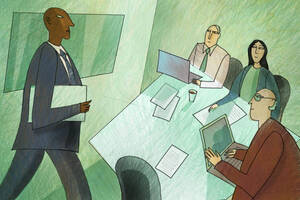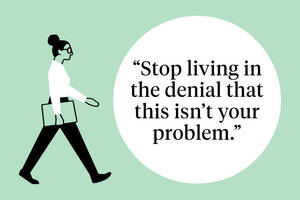Why, once it starts, is bad behavior difficult to curtail? What makes deceit such a hard habit to break?
New research from three faculty members at the Kellogg School sheds light on this phenomenon and the psychological processes that enable it. Maryam Kouchaki and Nour Kteily, both assistant professors of management and organizations, and Adam Waytz, an associate professor in the same department, found that people who cheat view themselves as having less capacity for certain uniquely human traits, such as self-control and planning. This dehumanized self-image, the researchers show, increases the likelihood that they will continue their bad behavior in the future.
“Because morally questionable behavior is uncomfortable, people don’t want to take responsibility for it,” Kouchaki explains. As a result, people subtly adjust their self-image and begin to view themselves as possessing fewer of the human traits that would curb that bad behavior. They, themselves, aren’t to blame, this line of thinking goes—they’re just not capable of behaving any better.
This process, which the researchers dub “self-dehumanization,” triggers a snowball effect, Kouchaki says: “You behave consistently with your self-view that you lack these human capabilities of agency and experience.” And, thus, you continue to behave badly.
Self-Dehumanization and Immoral Behavior
The researchers first established a link between acting unethically and self-dehumanization.
In one study, online participants were asked to write about either a time they behaved unethically, a time they behaved ethically, or a neutral experience (how they spend a typical evening). Then, participants answered a series of questions designed to measure self-dehumanization—such as “How capable are you of doing things on purpose?” and “How capable are you of experiencing emotion?”—on a scale of one to seven.
Participants who recalled past unethical behavior reported the highest levels of self-dehumanization, while participants who recalled past ethical behavior reported the lowest levels. Those who described their typical evening reported levels somewhere in between.
Another experiment showed similar results after participants read a first-person story about either ethical, unethical, or neutral behavior. Participants who read a narrative about cheating on an exam reported lower capacity for emotion, planning, and self-regulation than those who read about being tempted to cheat but choosing not to.
Lying for Cash
With the link between unethical behavior and self-dehumanization established, the researchers turned their attention to a second set of studies to see whether the connection held in the opposite direction: Did self-dehumanization increase dishonesty?
One group of online participants was asked to write about a time when they did not feel like themselves—for instance, a time when they were not capable of exercising self-control or acting intentionally. This was used to prime these participants to feel dehumanized. As a control, another group wrote about morning routines.
Then both groups were given a set of anagrams and were informed they would receive 25 cents for each one they reported solving.
But it was all a ruse: as a test of participants’ honesty, the researchers sneakily included one unsolvable anagram. Nearly half of participants primed to feel dehumanized falsely reported solving the unsolvable one, compared to just 29 percent of the participants writing about their morning routines.
A similar study had participants predict the outcome of a coin toss on an ostensibly independent virtual coin toss website. For every correct prediction, they would earn five cents.
Little did they know the researchers had access to the true outcome of each coin toss, so they could tell whether participants were lying. As predicted, participants who wrote about an experience of self-dehumanization cheated more than those who wrote about their morning routines.
A Cycle of Misconduct
In the final study, the researchers investigated the full cycle: does bad behavior, and the self-dehumanization it causes, beget more bad behavior?
Participants in the lab were told they would earn two dollars if they correctly predicted the outcome of a digital coin toss. This time the researchers had participants use a coin toss website that the team had created—and rigged.
The control group benefited from the rigged system and always correctly predicted the outcome of the coin toss, earning the two dollars. For another group of participants, the coin toss was always rigged against their prediction—but the coin toss website “mistakenly” told them to claim two dollars anyway. Then participants completed a form asking if there had been any problems with the experiment, providing a perfect opportunity to fess up about the mistake.
After this, participants answered survey questions assessing self-dehumanization and then completed a set of anagrams—which provided another opportunity for bad behavior. As in earlier studies, one was unsolvable, but participants could earn additional money if they claimed to have solved all of them.
Taken together, the study participants outside the control group were given the chance to lie, then were measured for self-dehumanization, and then were given the opportunity to lie again. And, the results showed, they often did.
Of the 293 study participants who had the option to cheat on the coin-flip task, nearly half took money they had not earned. These coin-toss swindlers went on to report greater self-dehumanization than participants in the control group—and those who self-dehumanized themselves were also much more likely to engage in anagram chicanery, too.
Once they started misbehaving, it seems, there were forces that helped them continue.
Ending the Cycle of Unethical Behavior
Self-dehumanization is not the only driver of repeated immoral behavior. For instance, Kouchaki has shown in previous work that unethical behavior leads to a kind of amnesia—we have fuzzy memories of our own bad behavior.
Understanding the complex and overlapping psychological defense mechanisms that enable bad behavior, Kouchaki says, “helps us make better decisions and think about our management, leaders, organizations, and structures a bit differently. What are the tools we can use to help people be more ethical?”
One tool Kouchaki thinks may be especially important is self-reflection.
The researchers point to a 2013 study that showed people who engaged in immoral behavior and subsequent self-dehumanization were actually less likely to offend again if they were given an opportunity to reflect on their unethical behavior and take responsibility for it.
“When you do something questionable, it’s very important to reflect back and deal with it and take responsibility for it. Otherwise, over time, it’s going to lead to other and bigger transgressions,” Kouchaki says.




